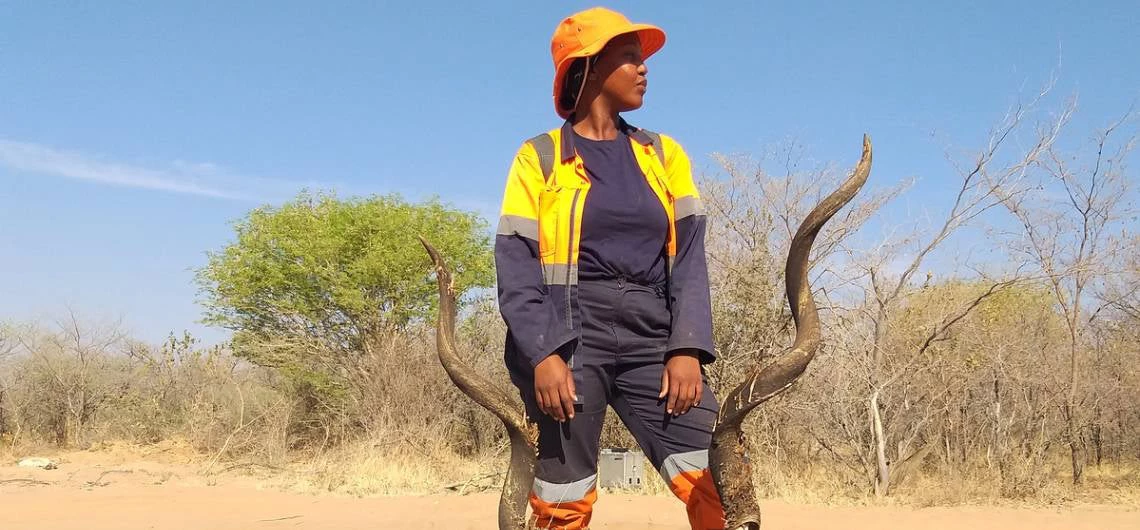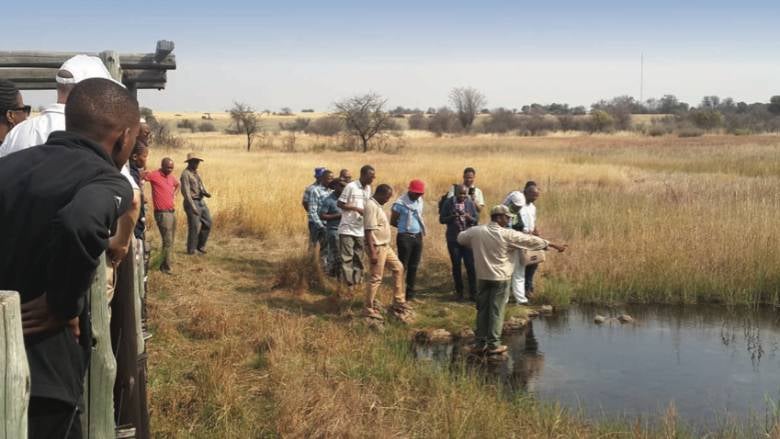 Matlhogonolo Mmese poses in front of an animal skull.
Matlhogonolo Mmese poses in front of an animal skull.
When Matlhogonolo Mmese of Gaborone, Botswana, was 16 years old, she thought long and hard about a career choice and decided to become a doctor. But soon after, she realized that she didn’t have a passion for medicine. She thought some more and chose hydrogeology. That decision stuck.
Today, Mmese, 25, is pursuing a master’s degree in hydrogeology at the University of Botswana. “In our country, most of the water that we drink is a little bit salty,” she says. “I want to help provide not just clean water, but water that tastes good.”
Groundwater is the primary source of water for over 70% of the population in the Southern African Development Community (SADC) region. However, due to a lack of understanding of the aquifers’ potential and to inadequate monitoring, its use can lead to overexploitation and contamination, jeopardizing sustainable groundwater management in the long term.
Salty water does not plague the capital city of Gaborone. But, growing up, Mmese gained first-hand knowledge about the water quality in different towns in Botswana because her mother, now retired, was an immigration officer posted throughout the country.
Mmese received her undergraduate degree in applied geophysics from the University of Botswana. Now, as a graduate student, she has won a Young Professionals scholarship of approximately US$12,000 from the Southern African Development Community Groundwater Management Institute (SADC-GMI) to pursue fieldwork for her thesis. The scholarship will help pay for tuition and expenses during her field study, especially for data collection and processing.
Matlhogonolo Mmese is a talented and motivated young female geoscientist with limited financial resources, aspiring to be a professional hydrogeologist,” professors Rubeni Ranganai of the University of Botswana and Modreck Gomo of the University of the Free State wrote in her scholarship application.
Mmese’s thesis is focused on the factors that control the occurrence of groundwater on the Botswana side of the Khakhea-Bray Transboundary Aquifer (TBA), which is shared by Botswana and South Africa. She plans to develop a conceptual model of the TBA using geophysical and hydrogeological data, with the ultimate goal of better management of groundwater resources.
Due to gaps in understanding groundwater, on its own and in conjunction with surface water, there is a high demand for more knowledge to inform decision-making in the region. The project will conduct studies on transboundary aquifers and generate transboundary diagnostic analyses and joint strategic action plans.
As one of only two women among seven students in her degree program, Mmese is aware of the challenges faced by women in the male-dominated field. “There is a need for you to prove that you belong there,” she says. “You need to put in more work to prove that you are good at your job.” Women have one advantage, she says. “Women are responsible. So, men tend to trust women. That’s the upside.”
Moving forward, the Young Professionals Program (part of the Sustainable Groundwater Management in SADC Member States Project Phase II or SADC-GWM Phase II) aims to update the Groundwater Literature Archive to reflect its current output, enrolling more Young Professionals, with a focus on increasing the participation of women.
Thanks to work on transboundary aquifers, like the study led by Matlhogonolo Mmese, a better understanding of regional groundwater is possible, including the valuation of groundwater, groundwater in island states and coastal aquifers, groundwater-dependent ecosystems, the water-energy-food-ecosystems nexus, and groundwater in megacities.
The SADC-GWM Phase II project will also focus on disseminating data and implementing innovative pilot projects. Its activities aim to promote sustainable groundwater management practices in the region and ensure the long-term health of groundwater resources.
Learn more about the Southern African Development Community Groundwater Management Institute (SADC-GMI)
On the Sustainable Groundwater Management in SADC Member States Phase 2 Project
Groundwater Dependent Ecosystems (GDEs) and Biodiversity in the Khakea/Bray Transboundary Aquifer
Policy, Legal and Institutional (PLI) and Gender Equality and Social Inclusion
IGRAC's new regional transboundary aquifer map of Africa identifies 106 TBAs
Related blogs
Training the next generation of groundwater specialists in the Sahel
Resources



Join the Conversation